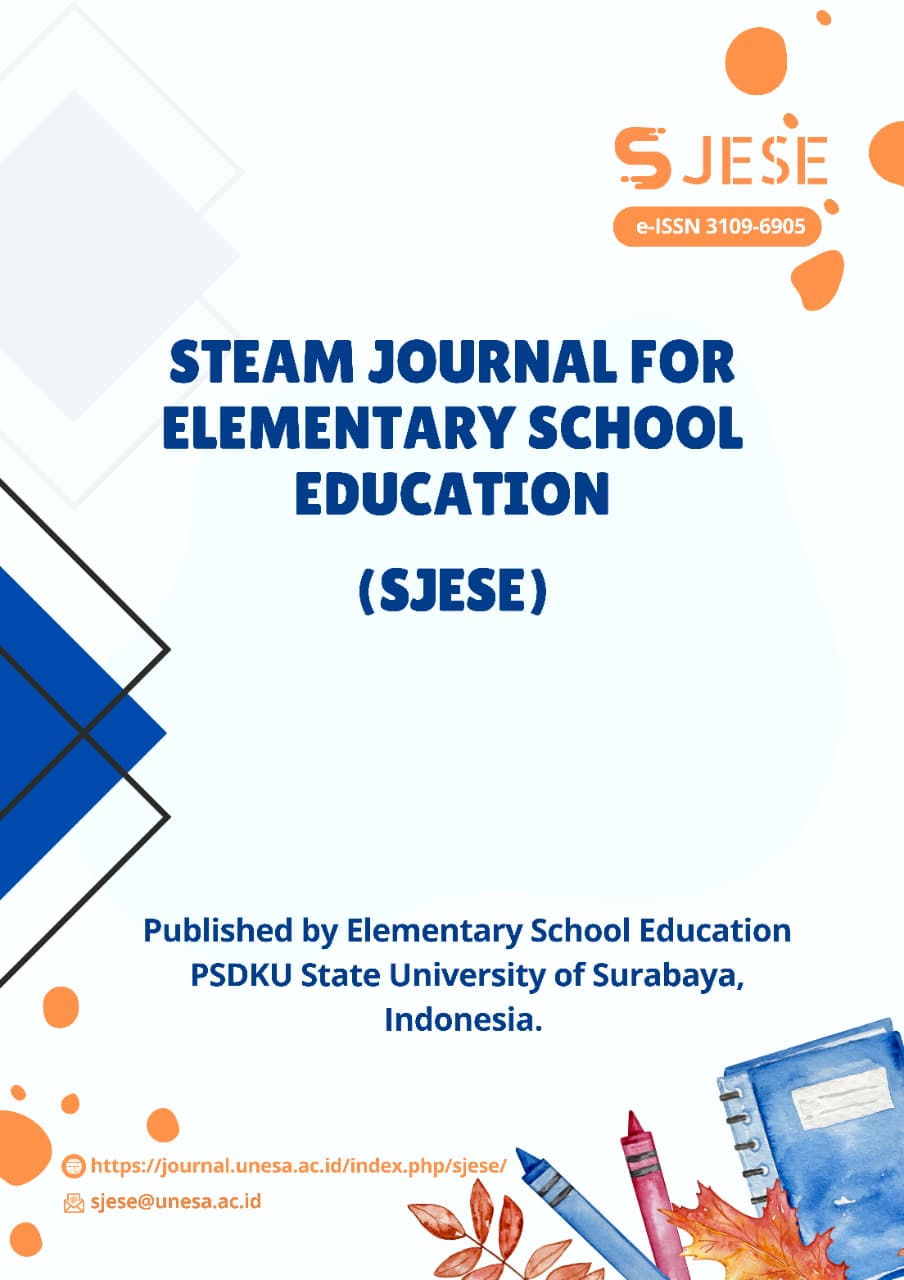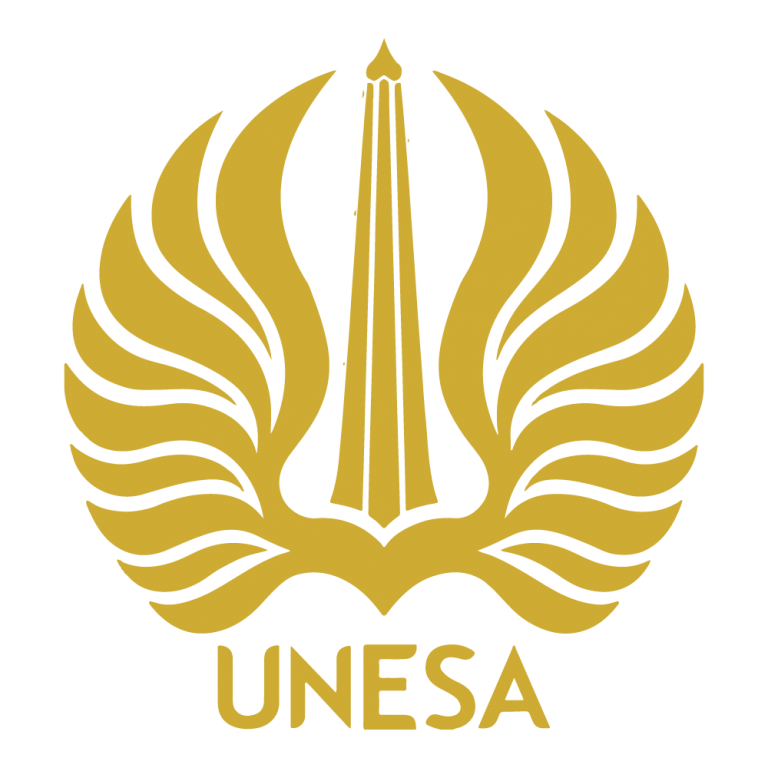STEAM Approach Focusing on Natural Sciences and Geometry in the Proliferation of Pigeons
DOI:
https://doi.org/10.26740/sjese.1.02.2025.6Keywords:
STEAM Approach, Teaching Geometry, Natural SciencesAbstract
This paper aims to analyze the STEAM approach in teaching Natural Sciences and Geometry in a Brazilian school. It is an excerpt from a study conducted with a view to disseminating investigative and creative pedagogical practices in K-12 Education. The teaching experience based on the STEAM approach, which is the focus of this article, explored the problem of the proliferation of pigeons in the surroundings of the school community identified by the students themselves. The scientific methodology applied in this study was Action Research, of a qualitative and exploratory nature. The data sources were the logbook, questionnaires, multimedia recordings and the productions developed throughout the investigative and creative practice. The research was developed in a peripheral school in Natal/RN, in northeast Brazil, in a second-year high school class with 32 students, in which the study of Geometry was planned for the entire school year. The results showed that the integration of STEAM areas, such as pedagogical practices in combating the proliferation of pigeons involving Mathematics, focusing on Geometry, and Natural Sciences, mobilized Hoffer's (1981) skills and critical thinking, collaboration, communication and creativity, as well as providing opportunities for student protagonism. It is concluded that the STEAM approach placed the student at the center of the learning process and provided opportunities for the mobilization of cognitive and socio-emotional skills in an application relevant to the school community chosen by the students.
References
Bacich, L., & Holanda, L. (2020). STEAM em sala de aula: a aprendizagem baseada em projetos integrando conhecimentos na educação básica (Desafios da Educação) - Penso Editora.
Brasil. (2018). Ministério da Educação. Base Nacional Comum Curricular. Brasília.
Bauer, M. & Gaskell, G. (2017). Pesquisa qualitativa com texto, imagem e som: um manual prático. Editora Vozes Limitada.
Bender, W. (2015). Aprendizagem baseada em projetos: educação diferenciada para o século XXI. Penso Editora.
Blanco, R. (2020). M de matemática. In: Bacich, L., & Holanda, L. STEAM em Sala de Aula: A Aprendizagem Baseada em Projetos Integrando Conhecimentos na Educação Básica (Desafios da Educação) (pp. 91-118). Penso Editora, 2020.
Cavalcante, L., Barbosa, M., & Silva, J. (2021). Revisão sistemática de literatura sobre a relação entre o teatro e o ensino de ciências e biologia no período de 2010 a 2019. ACTIO: Docência em Ciências, 6(1), 1-24.
Costa, N. (2020). A dificuldade no aprendizado de geometria. Trabalho de Conclusão de Curso (Especialização em Ensino de Ciências) – Universidade Tecnológica Federal do Paraná, Medianeira. https://repositorio.utfpr.edu.br/jspui/handle/1/25842.
D’ambrósio, U. (2020). Sobre las propuestas curriculares STEM y STEAM y el Programa de Etnomatemática. Revista Paradigma (Edición Cuadragésimo Aniversario), v. 41, jun. pp.151-167. https://doi.org/10.37618/PARADIGMA.1011-2251.2020.p151-167.id876.
D'Ambrosio, U. (2019). Humanity moving since pre-historic times to the future with creative STEAM. In Z. Babaci-Wilhite (Ed.), Promoting language and STEAM as human rights in education: Science, technology, engineering, arts and mathematics (pp. 163-175). Springer. https://doi.org/10.1007/978-981-13-2880-0.
Díaz, M., Rodríguez, M. & Barría, L. (2020). Caracterización de las habilidades STEM en procesos de etnomodelado con alumnos/as trabajadores/as migrantes haitianos/as de la ciudad de Talca. Estudios pedagógicos (Valdivia), 46(2), 397-419.
García, C. (2024). Geometría plana a través de libros de espejos basada en los niveles de Van Hiele. (Master's thesis, Universidad Miguel Hernández).
Hoffer, A. (1981). Geometry is more than proof. The Mathematics Teacher, 74(1), 11-18.
Leivas, J. & Lutz, M. (2023) A visualização para desenvolver o Pensamento Geométrico na Resolução de Problemas [livro eletrónico]. Alegrete, RS: TerriED Editora.
Lorenzato, S. (1995). Por que não ensinar Geometria? A Educação Matemática em Revista. Blumenau, 3(4), p. 3-13.
Lourenço, R. (2024). A abordagem STEAM no desenvolvimento de habilidades de Geometria no Ensino Médio. Dissertação (Mestrado Profissional em Inovação em Tecnologias Educacionais) - Instituto Metrópole Digital, Universidade Federal do Rio Grande do Norte, Natal. https://repositorio.ufrn.br/handle/123456789/58708.
Lourenço, R., Soares, R., Nunes, I., & Maia, D. (2025, March 17–22). Stop the Pigeon! A STEAM Project on Socio-Environmental Sustainability Awareness in a Northeastern Brazilian School.In R. Jake Cohen (Ed.), Proceedings of Society for Information Technology & Teacher Education International Conference (pp. 1480-1507) (SITE 2025). Orlando, FL, United States. Association for the Advancement of Computing in Education (AACE). Retrieved April 10, 2025 from https://www.learntechlib.org/p/225692/
Machado-Júnior, A., Vieira, L. & Netto, M. (2022). Habilidades geométricas no ensino médio: um diálogo com as teorias de Hoffer e dos Van Hiele. Revemop, 4, e202220-e202220.
Maia, D., Carvalho, R., & Appelt, V. (2021). Abordagem STEAM na educação básica brasileira: uma revisão de literatura. Revista Tecnologia e Sociedade, 17(49), 68-88.
Maia, D., Soares, R., Lourenço, R. & Moura, L. (2024). A abordagem STEAM como proposta pedagógica interdisciplinar para aprendizagem matemática. Revista Ensino em Debate, Fortaleza, v.2, p.e2024016. https://revistarede.ifce.edu.br/ojs/index.php/rede/article/view/48.
Moreira, L. (2021). IAgora: a itinerância em tempos de pandemia. ACTIO: Docência em Ciências, 6(2), 1-24.
OECD. Organização para a Cooperação e Desenvolvimento Econômico. (2023). PISA 2022 Results (Volume I): The State of Learning and Equity in Education. PISA. OECD Publishing, Paris. https://doi.org/10.1787/53f23881-en
Peretti, L. & Costa, G. (2013). Sequência didática na matemática. Revista de Educação do IDEAU, 8(17), 1-14. Recuperado a 22 de outubro de 2024 em https://www.caxias.ideau.com.br/wp-content/files_mf/8879e1ae8b4fdf5e694b9e6c23ec4d5d31_1.pdf
Pires, M. (2020). O STEAM e as atividades experimentais investigativas. In: Bacich, L., & Holanda, L. STEAM em Sala de Aula: A Aprendizagem Baseada em Projetos Integrando Conhecimentos na Educação Básica (Desafios da Educação) (pp. 51-68). Penso Editora, 2020.
Roberto, G., Royer, M., Zanatta, S. & Carvalho, H. (2021). O uso da educação steam para promover a aprendizagem matemática e conscientização ambiental. Revista Valore, 6, 746-760.
Soares, R. (2023). O ensino e aprendizagem de conceitos químicos por meio da Abordagem STEAM na Educação Básica. Dissertação (Mestrado Profissional em Inovação em Tecnologias Educacionais) - Instituto Metrópole Digital, Universidade Federal do Rio Grande do Norte, Natal. https://repositorio.ufrn.br/handle/123456789/55724.
Soares, R. & Maia, D. (2023). Abordagem STEAM no ensino de Química: o estado da questão. Conexões-Ciência e Tecnologia, 17, e022020-e022020. https://conexoes.ifce.edu.br/index.php/conexoes/article/view/2787/16
Zappe, J. & Sauerwein, I. (2018). Os pressupostos da educação pela pesquisa e o ensino de fungos: o relato de uma experiência didática. Revista Electrónica de Enseñanza de las Ciencias, 17(2), 476-490. https://reec.educacioneditora.net/volumenes/volumen17/REEC_17_2_10_ex1208.pdf.
Downloads
Published
Issue
Section
 Abstract views: 144
,
Abstract views: 144
, PDF Downloads: 116
PDF Downloads: 116









